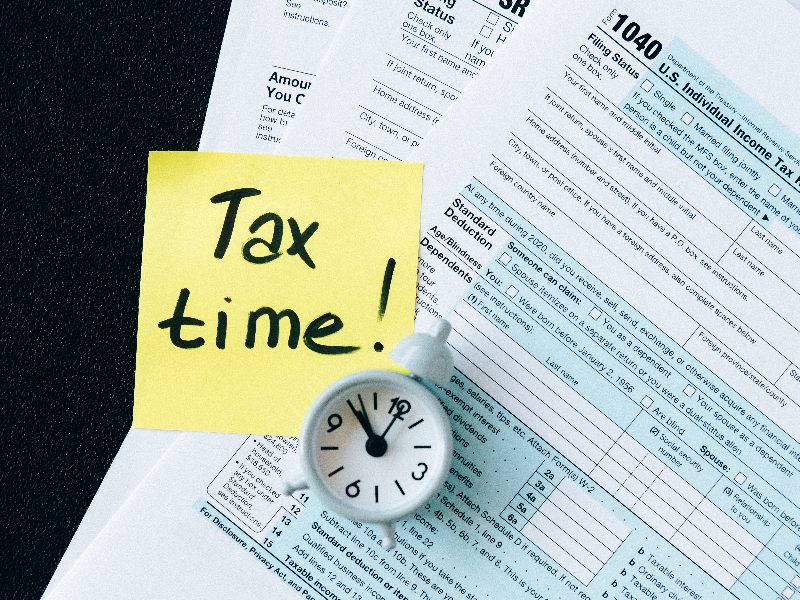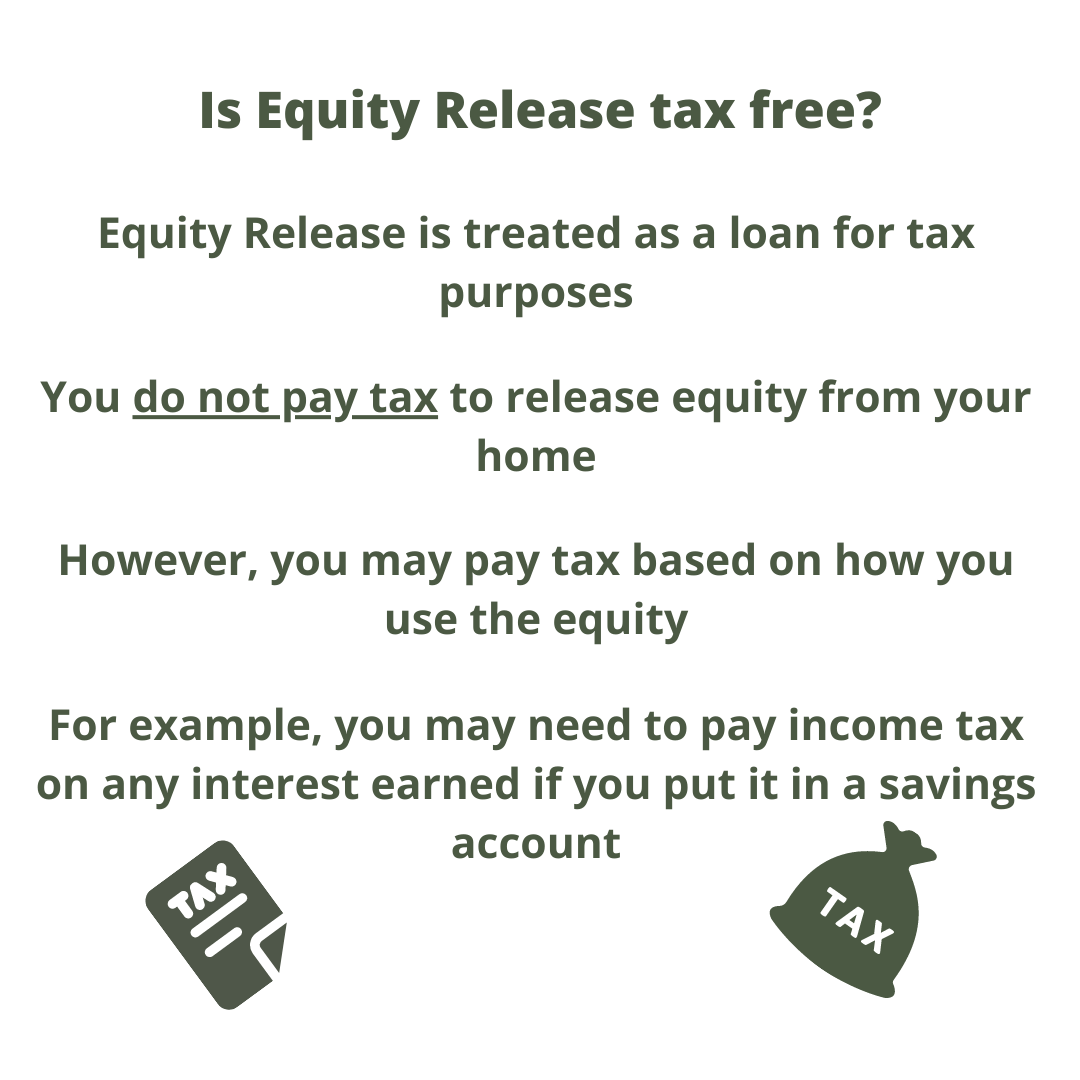
Yes. Releasing equity in your home is tax-free.
There are two forms of equity release; lifetime mortgages and home reversion schemes. Both types are treated as a loan and a liability for tax purposes.
However, how you choose to use the money may result in you paying tax. For example, if you invested it, you may be required to pay tax on the gains.
Although Equity release is tax free, you may run into some tax implications as a result of releasing equity. It's a good idea to have an understanding of these so you do not fall foul of the tax man.
In this insight, we will clarify the tax treatment of equity release across the different tax types and explain how you could become liable.
No. Equity release is not treated as an income. With a drawdown equity release mortgage, you are able to take money from your equity release facility when you choose to, up to an agreed amount. For example, you may choose to drip-feed yourself an "income" amount each year. However, this is not treated as an income. Even though the equity is yours, from the taxman's point of view, you are actually borrowing money each time you drawdown.
Be aware, if you were to use the equity release to generate income, then you may need to pay income tax. An example of this scenario could be if you decided to use the equity release funds to buy a pension annuity. An annuity provides you a regular income. If this income is over the income tax bracket, you will become liable for income tax. This is regardless of how you funded it in the first place.
You should carefully review your options if you are planning to borrow money to invest. It may not always go to plan.
There are three things to consider when looking into the impact equity release has on inheritance tax. That is the impact on the equity in the property, the impact on any cash left over, and the impact on any gifts.
If you are over the inheritance tax brackets, the tax liability on your property will be based on the remaining equity. This is the difference between the property value and the debt amount outstanding on the equity release loan, plus the interest.
For example, if your property sells for £500,000. Your equity loan was 20% of that (£100,000), and the outstanding interest was £10,000. When the equity release loan and interest is paid back from the sale of the property, what is left will be liable for tax. In our example, that would leave a liable IHT due on £390,000.
You can pass your property to your children and receive relief. The above scenario will only apply if you leave your property to someone outside of your immediate family.
If you have cash remaining from the release of equity, this will be included in the value of your estate. This means it will be included for inheritance tax calculations.
If you do have cash remaining in your estate, it might be that this money can be used to clear the equity release loan outstanding after death. However, Probate will be required before that can happen though.
If you used the equity release funds to make a gift, perhaps to grandchildren. You will need to survive 7 years after the gift was made to avoid the gift being part of your inheritance tax allowance. If you die within 7 years, taper relief may apply. Taper relief means your tax rate is reduced year after year of surviving, up until after the 7th year, when 0% tax applies.
It is a good idea to plan for inheritance tax if you are expecting to be liable. There are possible strategies that can be used to reduce your liability.
Yes. Equity release debt will be calculated as a liability in your estate. If you have spent the money from the equity release on anything that is not treated as an asset, you will not pay IHT on it. This would be the same logic as if you sold your house and spent all the money on holidays.
No. With home reversion plans, in theory, you do sell a percentage of your home. You may think that this could create a capital gains tax liability. However, it doesn't. Equity release is treated as a loan for tax purposes. Even with a home reversion plan, there is no capital gains tax liability to pay.
It is possible that how you use the money could result in you needing to pay Capital gains Tax. If you decide to invest the money outside of an ISA, the value could increase above the capital gains threshold. If that happens, when you sell your investment, you will be liable for capital gains tax.
The tax man views equity release as a loan. There is a risk that politics and tax could change, but right now there are no tax liabilities with the process of releasing equity. The only way that a tax liability could arise would be as a result of how you have used the equity released. If you use the money in a way that could lead to a tax liability, it will not matter that the source of the money was released equity and you will still need to pay your liability. Examples of this include:
It's a good idea to seek advice when looking into equity release and your plans for the money. Find an adviser who is a member of the equity release council. Equity release is regulated by the FCA and the equity release council helps to maintain high and safe standards of equity release practice in the industry.
You can find equity release advisers on Sunny Avenue. Create an account to message them directly.
No. When you drawdown on your equity release facility, from a tax perspective this is treated as an increase of your loan and not an income.
Even though you can sell a percentage of your property through equity release, in the eyes of HMRC, you are taking a loan. Loans are not classed as income and you will not pay tax.
Not many lenders will provide equity release on a second home. If you do find one, you will not pay tax as equity release loans are not taxable.

Stuart is an expert in Property, Money, Banking & Finance, having worked in retail and investment banking for 10+ years before founding Sunny Avenue. Stuart has spent his career studying finance. He holds qualifications in financial studies, mortgage advice & practice, banking operations, dealing & financial markets, derivatives, securities & investments.
 No minimum
No minimum  Leyland, Lancashire
Leyland, Lancashire No obligation consultation
No obligation consultation
 No minimum
No minimum  No obligation consultation
No obligation consultation
 No minimum
No minimum  Free Consultations
Free Consultations
 No minimum
No minimum  No obligation consultation
No obligation consultation
 No minimum
No minimum  Initial fee free consultation
Initial fee free consultation
 No minimum
No minimum  Initial fee free consultation
Initial fee free consultation
 £51,000+
£51,000+  Free Consultations
Free Consultations
 No minimum
No minimum  Initial fee free consultation
Initial fee free consultation
 £101,000+
£101,000+  Bishop's Stortford, Hertfordshire
Bishop's Stortford, Hertfordshire No obligation consultation
No obligation consultation
 No minimum
No minimum  Initial or Ongoing Consultation Fees
Initial or Ongoing Consultation Fees
 No minimum
No minimum  Initial fee free consultation
Initial fee free consultation
 No minimum
No minimum  Initial fee free consultation
Initial fee free consultation
 £51,000+
£51,000+  Sheffield, South Yorkshire
Sheffield, South Yorkshire No obligation consultation
No obligation consultation
 No minimum
No minimum  No obligation consultation
No obligation consultation
 No minimum
No minimum  Newcastle-under-Lyme, Staffordshire
Newcastle-under-Lyme, Staffordshire Free Consultations
Free Consultations
 No minimum
No minimum  Free Consultations
Free Consultations
 No minimum
No minimum  No obligation consultation
No obligation consultation
 No minimum
No minimum  No obligation consultation
No obligation consultation
 No minimum
No minimum  Free Consultations
Free Consultations
 No minimum
No minimum  No obligation consultation
No obligation consultation
 No minimum
No minimum  Coatbridge, Lanarkshire
Coatbridge, Lanarkshire Initial or Ongoing Consultation Fees
Initial or Ongoing Consultation Fees
 No minimum
No minimum  Initial or Ongoing Consultation Fees
Initial or Ongoing Consultation Fees
 £21,000 +
£21,000 +  Initial fee free consultation
Initial fee free consultation
 London, Greater London
London, Greater London No obligation consultation
No obligation consultation
 No minimum
No minimum  No obligation consultation
No obligation consultation





Our website offers information about financial products such as investing, savings, equity release, mortgages, and insurance. None of the information on Sunny Avenue constitutes personal advice. Sunny Avenue does not offer any of these services directly and we only act as a directory service to connect you to the experts. If you require further information to proceed you will need to request advice, for example from the financial advisers listed. If you decide to invest, read the important investment notes provided first, decide how to proceed on your own basis, and remember that investments can go up and down in value, so you could get back less than you put in.
Think carefully before securing debts against your home. A mortgage is a loan secured on your home, which you could lose if you do not keep up your mortgage payments. Check that any mortgage will meet your needs if you want to move or sell your home or you want your family to inherit it. If you are in any doubt, seek independent advice.